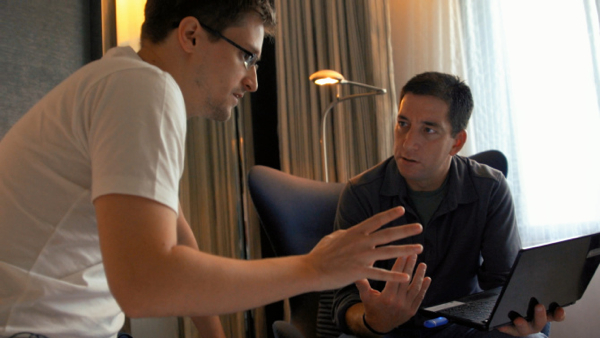Movie review by Greg Carlson
Oscar-winning documentary feature “Citizenfour” is a you-are-there record of the National Security Agency’s global and domestic surveillance program revelations by whistleblower Edward Snowden in 2013, and what it lacks in cinematic panache it more than makes up for in jaw-dropping urgency and bomb-blast power. Alan Scherstuhl astutely points out that the movie is “a must-see piece of work even if, in its totality, it’s underwhelming as argument or cinema.” The movie earns its accolades for right place/right time history in the making, as filmmaker and activist Laura Poitras, who feared that her footage might be seized by the United States government, sits down face-to-face with Snowden in a Hong Kong hotel room.
Poitras was contacted by Snowden prior to his release of the NSA documents, and the filmmaker’s decision not to inert herself more directly into the content of the movie is a bold and surprising choice in an industry where documentarians routinely brand themselves as marketable first-person characters. Although she remains offscreen, Poitras is still a vital presence in the unfolding story. She narrates some of her electronic messages to and from Snowden. Her camera functions not as a fly on the wall but rather as an active participant. The result allows the viewer nerve-jangling access to the principal agents and their conversations.
In the room with Poitras and Snowden are Glenn Greewald and Ewen MacAskill on behalf of “The Guardian,” and the filmmaker records much of the rapidly unfolding drama by assembling both the narrative substance of Snowden’s revelations and the metanarrative commentary emerging from discussions between the journalists and Snowden as they strategize behind the scenes. Snowden’s desire to stay ahead of both the media and the moves of the U.S. government leads to fascinating debate that ponders how to avoid making Snowden himself the “story,” even as the writers anticipate the coming flood of international interest in the young man.
The exchanges between Greenwald, the U.S.-born lawyer and political commentator, and Snowden, are electrifying. We look on as the two men challenge and test one another. Whether deliberate or not, Poitras alludes to the way in which – at this particular moment in time – each needs something the other possesses. Sometimes, the back and forth leans toward paranoid incredulity, but Snowden continues to offer compelling evidence in support of his claims. The Greenwald/Snowden dialogue offers unprecedented entree to vital knowledge regarding the iceberg of state-sanctioned spying on its own populace, even if we are just seeing the tip.
“Citizenfour” has been classified as nonfiction, but plays a lot like a Hollywood conspiracy thriller. The legacy of Snowden, which is still very much being written, begins with the premise that the rise and ubiquity of digital technology has made the collection of previously private data, from the contents of phone calls to every website visited and every purchase made, the once secret prerogative of the agencies that form our government. At one point in the film, Snowden says, “”We all have a stake in this. This is our country and the balance of power between the citizenry and the government is becoming that of the ruling and the ruled as opposed to actually, you know, the elected and the electorate.”
